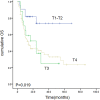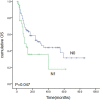Prognostic Factors for Patients with Esophageal Cancer Receiving Definitive Radiotherapy Alone: A Retrospective Analysis
- PMID: 33880065
- PMCID: PMC8053528
- DOI: 10.2147/CMAR.S300672
Prognostic Factors for Patients with Esophageal Cancer Receiving Definitive Radiotherapy Alone: A Retrospective Analysis
Abstract
Purpose: Intensity-modulated radiotherapy (IMRT) can improve the prognosis of patients with esophageal cancer. This study aimed to evaluate clinical factors relevant to the prognosis of patients with esophageal cancer who received intensity-modulated radiotherapy (IMRT) alone.
Patient and methods: Data of 103 patients with pathologically confirmed esophageal cancer who were admitted to our hospital between October 2011 and November 2017 were retrospectively reviewed. All patients had squamous cell carcinoma. All patients received IMRT. Patients with stage I-IVA tumors were included to represent the real-world clinical practice. We performed univariate and multivariate analyses to identify prognostic factors for overall survival (OS) and progression-free survival (PFS). In univariate analyses, the Kaplan-Meier method was used to estimate OS and PFS for various subgroups. In multivariate analyses, hazard ratios were calculated.
Results: Single-factor analysis revealed that T stage (P=0.019), N stage (P =0.047), and lesion length (P =0.000) were associated with the prognosis of esophageal cancer patients who received IMRT. Cox regression analysis revealed that T stage (odds ratio [OR] = 4.68; P < 0.05), N stage (OR = 0.28; P < 0.05), and lesion length (OR = 0.09; P < 0.05) were independent factors relevant to prognosis.
Conclusion: T stage, N stage, and lesion length influenced the long-term curative effects of IMRT for esophageal cancer and were prognostic factors for patients with esophageal cancer receiving definitive radiotherapy alone. The higher the stage and the longer the tumor, the lower the survival rate.
Keywords: esophageal neoplasms; intensity-modulated radiotherapy; prognosis; retrospective studies.
© 2021 Jiang et al.
Conflict of interest statement
The authors declare that they have no conflicts of interest.
Figures




References
LinkOut - more resources
Full Text Sources
Other Literature Sources

